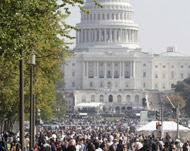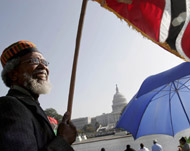Entered into the database on Saturday, October 15th, 2005 @ 18:08:46 MST
Thousands of African-Americans, young and old, have rallied in Washington,
frustrated with lingering inequalities in the United States. "This is the start of getting black people together to get organisation
to get some change," said Amon Ra, 50, an Ohio state employee who on Saturday
drove more than 10 hours with his son to attend the "Millions More Movement"
event, a decade after the "Million Man March" to empower black men
in the United States. "We feel that, since black men occupy the majority of the unemployment
rate, that we need to get some change to get them employed so they can take
care of their families," Ra said, as marchers trudged to the venue in colourful
T-shirts, some toting signs reading "Defend Affirmative Action." Broad coalition The "Millions More Movement" is aimed at bringing men, women and
youth into "an effective national movement with the goal of transforming
American society and eliminating poverty and injustice," organisers said
in a statement. The event was organised by a broad coalition, including the Nation of Islam
led by Louis Farrakhan, Reverend Jesse Jackson of the National Rainbow/PUSH
Coalition, the National Association for the Advancement of Colored People (NAACP)
and rap mogul-activist Russell Simmons, among others. "We must now stand in this Millions More Movement for accountability,"
said Representative Sheila Jackson Lee, a Texas Democrat. For Sarah Thompson, an ebullient student at Spelman College in Georgia, it
was an occasion not to be missed. "I came to say that young women are so powerful," said Thompson, 21.
"And that young people are not apathetic. "We are going to defend the dreams of our forefathers!" she said
on the National Mall, within sight of the White House. Bush unpopular "There are so many things - health care, the economy" - that make
marching worthwhile, said Ernest Twyman, a spry 86-year-old Washington resident. "There is not much being done for our people. (President George) Bush
hasn't done anything. The rich keep getting richer and the poor keep getting
poorer," Twyman said. "You see, we were freed from one thing and now we are in economic slavery,"
Twyman said. "And economic slavery is just as bad as physical slavery." "Black people (in the US) have survived genocide," added Ra, who
voiced hope the mass gathering could foster "black nationalism" inside
the United States. Among the celebrities helping to fuel turnout were hip-hop and Hollywood stars
Snoop Dogg, LL Cool J and Queen Latifah, as well as designer-rapper-actor-activist
Sean "Diddy" Combs, Public Enemy and Wyclef Jean, who wowed the banner-waving
crowd. Rapper Kanye West, who accused Bush during a nationally televised Hurricane
Katrina fundraiser of not caring about blacks, also supports the movement. Cuban message The man who is arguably the most powerful African-American politician, US Senator
Barack Obama - a rising star of the Democratic Party - was scheduled to be in
his home state Saturday, his website said. Obama is currently the only black person
in the US Senate. James Gibson, a cable engineer who drove in his family of six from Connecticut,
said he was keen to hear Farrakhan speak and hoped "that we as a whole
can get together and get unified." In a strange diplomatic twist, Ricardo Alarcon, the speaker of the Cuban National
Assembly, appeared in a video message congratulating Farrakhan and complaining
that the United States had rejected communist Cuba's offer of medical assistance
after Hurricane Katrina. "In the country that is supposed to be the richest one, the most powerful
one, we learned that there is also a lot of misery," Alarcon said. "We
are neighbours and we should be working together." African-Americans made up 12.9% of the total US population in 2000, government
data show.

